Robin Wright
- 1975

Fellowship Title:
- The Dismantling of Portugal's African Empire
Fellowship Year:
- 1975
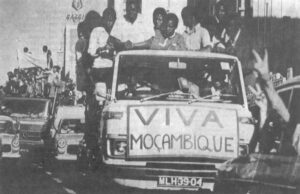
Mozambique: Six Months After Independence
On December 25, Mozambique celebrated six months of independence from Portuguese colonial domination. While peaceful in comparison with Angola, another former Portuguese colony now torn by a bitter civil war, Mozambique is also facing serious problems that threaten its stability. Robin Wright spent nearly four months in Mozambique during the transition and independence periods, touring the country and talking with officials of Frelimo, the movement that fought a ten-year liberation war and took over from the Portuguese an June 25. Based on interviews with Mozambique officials encountered recently in Angola and Zambia, diplomats assigned to Lourenco Marques, and Mozambique contacts, Wright offers the following assessment of the southeast African territory six months into independence. Signs of celebration at Mozambique’s Independence: But there has not been much to celebrate during Frelimo’s first six months. The bread lines are blocks long and meat is rationed. Agricultural production has declined dramatically despite the massive relocation of both rural and urban dwellers onto new collective farms. Technicians and professionals continue to flee the country. And growing political dissent burst
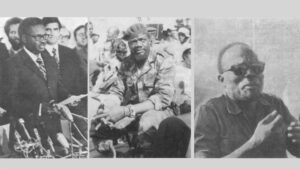
Men at War: Angola’s Liberation Leaders
Behind the bitter civil conflict that currently divides Angola into three zones of influence and two separate governments are three men: Dr. Agostinho Neto of the Popular Liberation Movement (MPLA), Dr. Jonas Savimbi of the Union for Total Independence (UNITA), and Holden Roberto of the National Liberation Front (FNLA). Dr. Neto is president of the Peoples Republic of Angola, based in the vast and central areas of the country. Dr. Savimbi and Mr. Roberto have formed an uneasy alliance in a joint government as the Peoples Democratic Republic, covering the northern and southern territories. Both governments claim to “truly represent all the people of Angola.” Robin Wright recently spent five weeks in Angola and had an opportunity to meet each leader in his home base during a tour with the Conciliatory Commission or the Organization of African Unity. The report that follows is an assessment of these three distinct and disparate personalities. Dr. Agostinho Neto: Popular Liberation Movement (MPLA) Luanda, Angola Dr. Agostinho Neto has all the proper credentials for an African liberation leader —
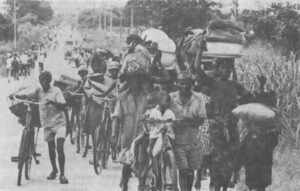
Angola: Battling for Birth
On November 11 the massive southwest African territory of Angola gained independence after 500 years of Portuguese colonial domination. But while the longest liberation struggle in black Africa has ended, the trouble is far from over. A bitter civil conflict among the three rival movements for complete control of the country prevents the factions from focusing attention on the many political and social problems of a new nation. Most of the recent publicity has focused on the military situation — progress on the two fronts, goals of the factions, and the arms race. But Angola has many other problems to face as a new nation. Robin Wright recently spent five weeks in Angola, visiting all three areas of the country. In the following report, Wright assesses some of the non-military troubles in Angola that spell a lonely and bleak future for this country, which was once considered an idyllic tropical haven capable of realizing vast wealth from mineral and agricultural resources and offering its population a good life. Luanda, Angols Just before sunset on
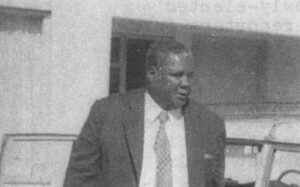
Joshua Nkono: Rhodesia’s Leading Black
With his recent election as the new president of Rhodesia’s black nationalist movement, Joshua Nkomo finally gained the position for which he has long worked. Although an active nationalist for 20 years, the stout and personable leader previously held minimal power because of competition from three rival liberation movements. But the four factions merged under the African National Council (ANC) umbrella last December with Bishop Abel Muzorewa as chief spokesman. The Sept. 28 election replaced the Bishop with Mr. Nkomo. A closer look at Mr. Nkomo’s background and political views may offer some insight on the future course of events, now that Rhodesia’s black and white populations are confronting each other over the issue of black majority rule. Robin Wright interviewed the ANC president on several occasions during a month-long tour of Rhodesia. The following report provides some perspective on the man who may be Zimbabwe’s — the African name for Rhodesia — first black Prime Minister. Highfield, Rhodesia Joshua Nkomo is what one politely calls “big.” Big in politics, but equally big in
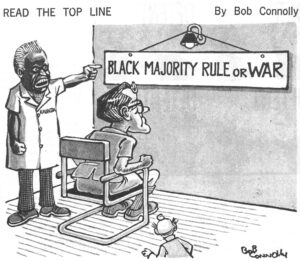
Rhodesia: Which Way at the Final Crossroad?
As the tenth anniversary of its unilateral independence from Britain approaches, the Rhodesian government faces the most dramatic decision in its history: settlement with black nationalists or war. Prime Minister Ian Smith has stalled on the issue of black majority rule for a decade and through four settlement efforts, but now increased internal and external pressures are forcing him to face the alternatives head on. The changing political face of southern Africa in the past year is part of the reason. Mozambique — the neighbor with the longest common border — came under black rule in June. Angola to the northwest is scheduled to become independent on Nov. 11, the same day as the Rhodesian anniversary. And Southwest Africa has started the constitutional talks leading to independence. But more importantly four neighboring black African countries have moved to back the demands of Rhodesian nationalists, to the point of supporting a war if necessary. And South Africa, Rhodesia’s closest ally, has demanded that Mr. Smith settle. Robin Wright covered negotiations at Victoria Falls and spent a
